News
Government coffers swell from record inheritance tax receipts

Guest Author:
Shekina TuaheneThe Inheritance tax (IHT) intake in June reached £726m, the highest total since records began.
It was up from the £564m recorded in May and HMRC said this could be due to a small number of higher value payments than normal.
In the three months to June, receipts reached £1.8bn which is £300m more than the same period last year.
Stephen Lowe, group communications director at Just Group, said frozen tax thresholds and the booming property market were key drivers of growing IHT receipts.
He said: “While only a small proportion of people pay IHT, the amount being paid has more than doubled over the past decade from £752m in Q1 2012 to over £1.5bn Q1 2022.
“The nil rate bands – the size of the estate that can be left without paying any IHT – are set to remain frozen until 2026 and so we can expect to see more and more estates become liable for inheritance tax between now and then.”

How life insurance can benefit your health and wellbeing over the decades
Sponsored by Post Office
Lowe added that The Office for Budget Responsibility (OBR) forecasts that as many as 6.5% of estates could be liable for inheritance tax by 2026 – nearly double the 3.7% that the figures show for the latest financial year.
“The OBR also revised inheritance tax forecasts up by an average of £0.4bn a year compared to October 2021 estimates because of increased mortality as well as higher house prices,” he said.
He explained that residential property was usually the “most valuable component” of estates which pay the tax, adding that the latest Office for National Statistics house price index showing a 13% annual rise in value meant people were approaching or surpassing the threshold unknowingly.
Lowe added: “It makes good sense for people to keep track of the likely size of their estate and the tax rules that will apply to it.”
Stamp duty
The figures from HMRC revealed its stamp duty intake surged 40% annually to £7.5bn in the first half of 2022.
Stamp duty land tax receipts came to £1.34bn in June, up on the £1.22bn received last month. This was a slight rise on the £1.21bn received in June last year.
Helen Morrissey, senior pensions and retirement analyst at Hargreaves Lansdown, said: “Our love affair with property continues as stamp duty continues to surge – soaring 27% to £5.2bn between April and June. The pandemic may have convinced people they needed more space and fuelled a move to larger properties but since then we’ve continued to see huge activity in the property market, and it is running red hot. Recent data from Rightmove shows asking prices are at an all-time high but even this isn’t enough to put people off wanting to get their hands on their dream home.
“How long this can continue is subject to debate. The same data shows the number of buyers is starting to fall while the number of people wanting to sell is on the increase. The cost-of living crisis may also lead to more people looking to tighten their belts. The likelihood is we will see the market start to cool off in the coming months. Added to this the stamp duty holiday was also still in force this time last year and will also have had an impact on the increased figures.
Income tax and National Insurance
Receipts for the three months to June 2022 stand at £98.2bn, which is £13.4bn higher than in the same period a year earlier. HMRC revealed the number of paid employees increased by 3.9%, a rise of 1,1 million people, while median monthly pay increased by 5.4%, compared with the same period in the previous year.
Shaun Moore, tax and financial planning expert at Quilter, said: “This month’s data highlights the continued impact on pay packets from the third month of increased NI contributions as a result of the government’s 1.25 percentage point hike which has been in place since 6 April. These receipts were also boosted by a rise in the number of paid employees in the last month, as well as a steady increase in monthly pay.
“However, three months on from the National Insurance hike, the National Insurance Primary Threshold has been increased to £12,570 to be in line with the Income Tax threshold. While the hike will have made an unwelcome dent in people’s take home pay over the past few months, this will now ease somewhat. As the threshold has been increased we would expect to see a dip in NI payments from this month onwards.”